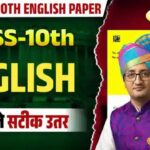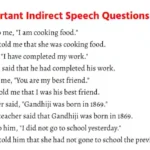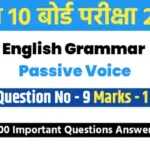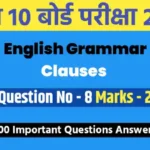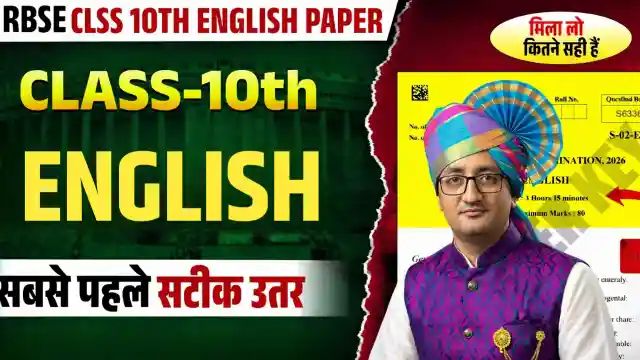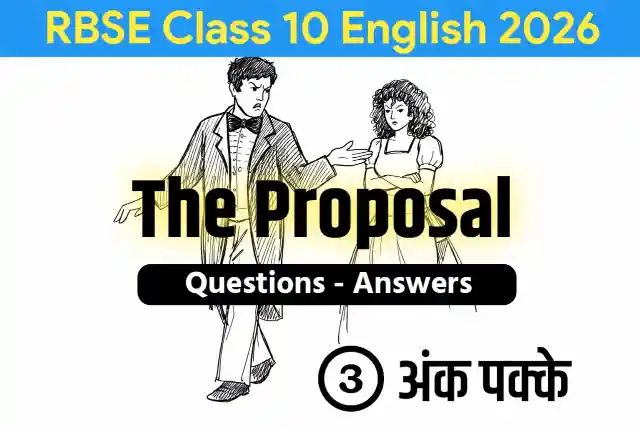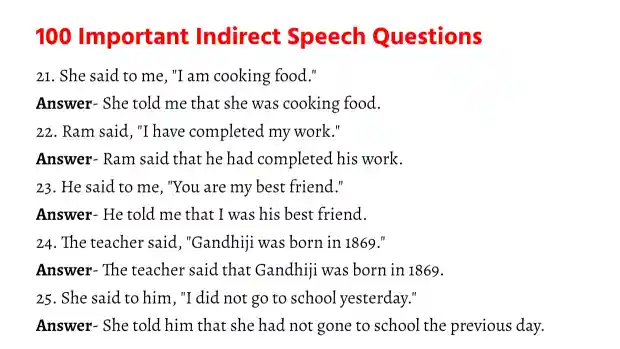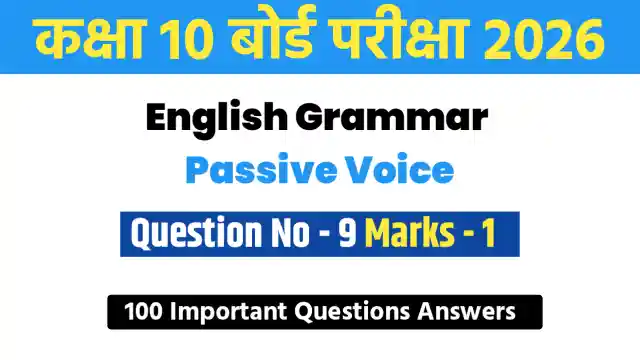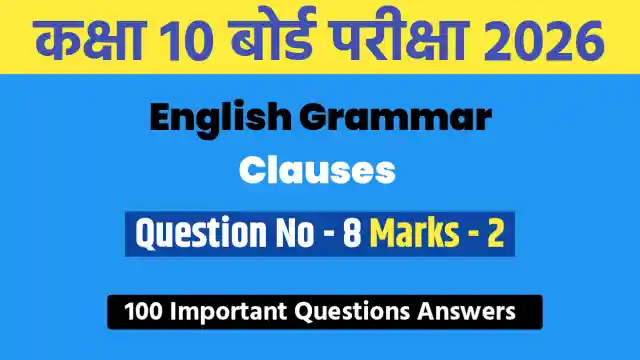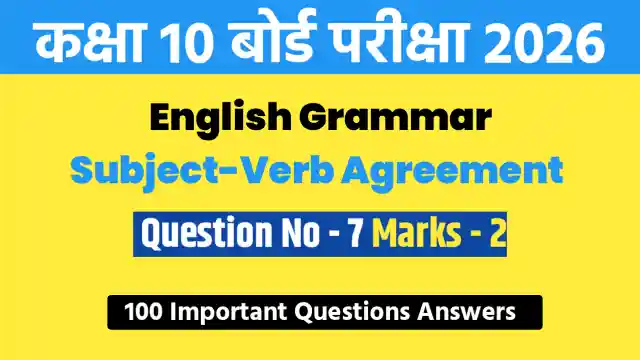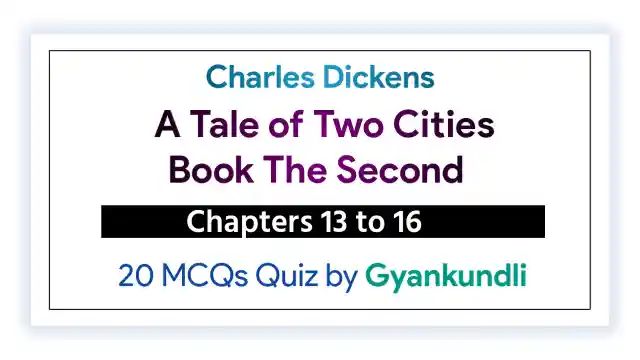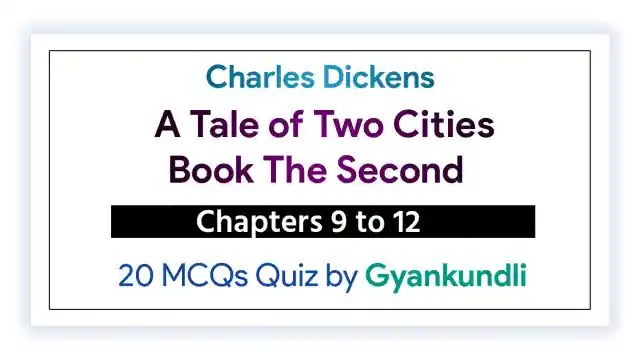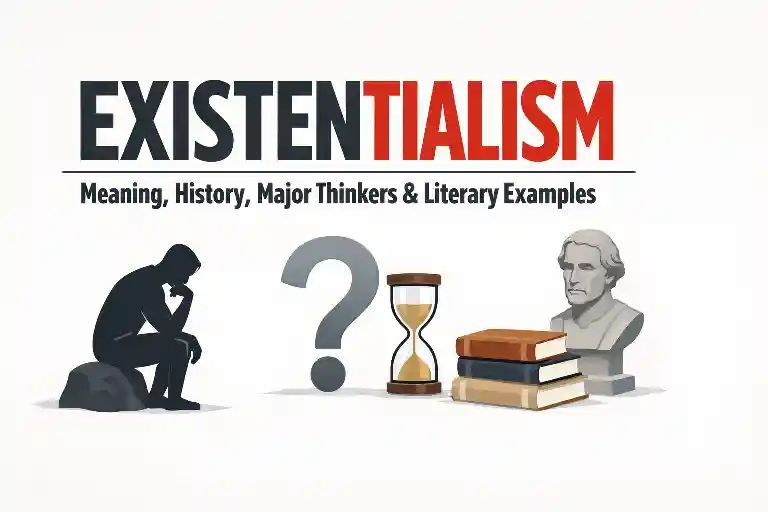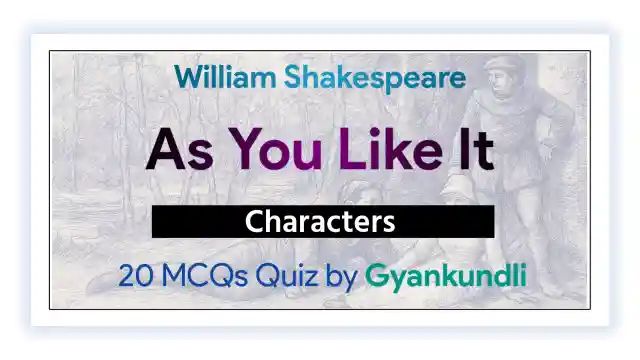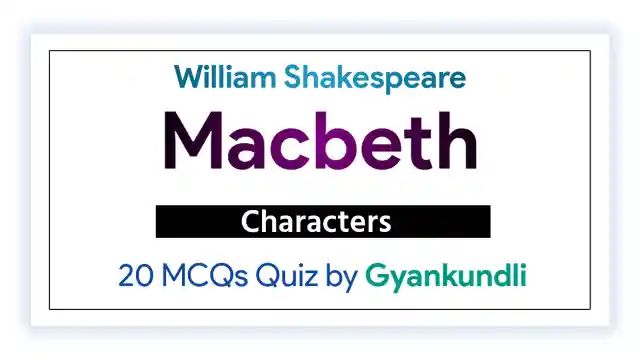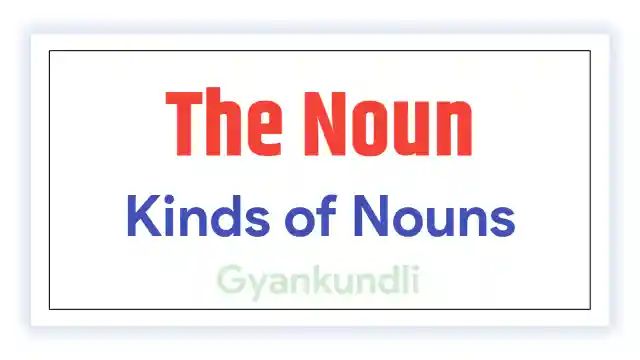RPSC 2nd Grade English Answer Key 2025 : In this blog post, we have provided the paper solution or answer key to RPSC 2nd Grade English Exam held on 12 September 2025. We have tried our best to avoid mistakes in the answer key, but there may be some sort of typing mistakes. We will update this article time to time.
RPSC 2nd Grade English Answer Key 2025 : Question 1 to 30
1. Which one of the given options correctly analyses the following sentence in terms of SPOCA?
‘They painted the door green.’
(1) SPCA
(2) SOPC
(3) SPOO
(4) SPOC
(5) Question not attempted
2. From the kinds of adverbs given below, choose the one which does not fit into the given category –
(1) Place : here, there, near, down
(2) Manner : fast, happily, hard, quickly
(3) Time : soon, still, then, today
(4) Degree : always, never, occasionally, often
(5) Question not attempted
3. Choose the correct indirect speech for the sentence given below –
A woman said to me, ‘Do you know my name?’
(1) A woman asked if I know my name.
(2) A woman asked if I knew her name.
(3) A woman asked if I am knowing her name.
(4) A woman asked if you know my name.
(5) Question not attempted
4. Which one of the following, correctly combines the two simple sentences into a complex sentence?
‘Angels fear to tread in some places. Fools rush in there.’
(1) Angels fear to tread in some places and fools rush in there.
(2) Angels fear to tread in some places but fools rush in there.
(3) Not only angels but also fools tread in some places and rush in there.
(4) Fools rush in where angels fear to tread.
(5) Question not attempted
5. Match the words in column ‘A’ with their synonyms in column ‘B’ and then choose the correct code given below –
(A) (B)
(1) Compassion (a) Frail
(2) Feeble (b) Impartial
(3) Just (c) Sympathy
(4) Modest (d) Humble
Code –
(1) (1)-(d), (2)-(c), (3)-(b), (4)-(a)
(2) (1)-(c), (2)-(b), (3)-(d), (4)-(a)
(3) (1)-(c), (2)-(a), (3)-(b), (4)-(d)
(4) (1)-(b), (2)-(c), (3)-(a), (4)-(d)
(5) Question not attempted
6. Choose the correct analysis of the given sentence in terms of SPOCA –
Tom, on Monday, saw the giant.
(1) SOAP
(2) SAPO
(3) SPOA
(4) SAOP
(5) Question not attempted
7. Fill in the blanks with appropriate prepositions. Choose from the options given below –
I went ………… London last weekend and stayed ………… a friend’s flat.
(1) towards, for
(2) at, in
(3) to, at
(4) in, with
(5) Question not attempted
8. Fill in the blanks with appropriate tense. Choose from the options given below –
I ………… (have) a shower when I ………… (slip) on the soap and ………… (bang) my head on the wall.
(1) will be having, slipped, bang
(2) am having, slipped, banged
(3) was having, slipped, banged
(4) having, slipped, banging
(5) Question not attempted
9. Now, I ………… not swim across the river. I ………… swim, when I was young. (ability)
(1) should ; can
(2) must ; may
(3) can ; could
(4) could ; may
(5) Question not attempted
10. Which of the following sentence has a subordinate clause in it?
(1) He bought his uncle’s library.
(2) Cain, being jealous of Abel, struck him.
(3) He confessed his crime.
(4) The management is as bad as it could be.
(5) Question not attempted
11. In which of the following sentence the use of preposition is incorrect?
(1) Child-marriage is a great hindrance to progress.
(2) He hindered me from going.
(3) I have often found him negligent of his work.
(4) His distrust of his assistants is perhaps unfounded.
(5) Question not attempted
12. What does the underlined phrasal verb mean in the sentence below?
Don’t run away with the idea that I am unsociable; I just haven’t got time to go out much.
(1) bring together something
(2) accept an idea too hastily
(3) pursue
(4) bear patiently
(5) Question not attempted
13. Choose the correct indirect speech of the sentence given below –
Clare said, ‘What time do the banks close?’
(1) Clare asked the time of closing banks.
(2) Clare said that what time does the bank close.
(3) Clare wanted to know what time the banks closed.
(4) Clare asked what is the time of bank closing.
(5) Question not attempted
14. Fill in appropriate articles/determiners in the blanks. Choose from the options given below –
(A) I’ve seen ………… good films recently.
(B) What’s wrong with you? Have you got ………… headache.
(C) I know ………… lot of people. Most of them are ………… students.
(D) It’s ………… insect.
(1) (A) : a, (B) : an, (C) : a, × (D) : an
(2) (A) : some, (B) : a, (C) : a, × (D) : an
(3) (A) : some, (B) : ×, (C) : ×, × (D) : an
(4) (A) : the, (B) : ×, (C) : a, the (D) : an
(5) Question not attempted
15. Choose the incorrect sentence in terms of degrees –
(1) It was the exciting summer of their lives.
(2) She came out of the thickest part of the crowd.
(3) He was the cleverest man I ever knew.
(4) Now we come to the most important thing.
(5) Question not attempted
16. Identify the correct phrase analysis in terms of MHM in the given sentence –
‘Very intriguing film about politics.’
(1) MHMM
(2) MMHM
(3) HMM
(4) MMH
(5) Question not attempted
17. Which of the following sentence does not have correct subject-verb agreement?
(1) Neither praise nor blame seems to affect him.
(2) Either the boy or his parents has erred.
(3) He and I are well.
(4) Either he or I am mistaken.
(5) Question not attempted
18. Choose the correct option, after reading the following –
In the phrase : ‘Brown, wooden, rectangular tables in the classroom.’
(A) The Head is tables.
(B) The phrase has pre-modifiers.
(C) The phrase has post modifier.
(D) The Head is classroom.
(1) (C) and (D) are incorrect.
(2) (A), (B) and (C) are correct.
(3) (A), (B) and (C) are incorrect.
(4) Only (D) is correct.
(5) Question not attempted
19. Phonetic transcription of the word “contribution” is …………
(1) /kɒntrɪbjuːʃən/
(2) /kɔːntrɪbjʊʃən/
(3) /kɒntrɪbjʊʃən/
(4) /kəntrɪbuːʃʌn/
(5) Question not attempted
20. The phrase ‘The house beyond the Church’ has –
(1) Post modification by prepositional phrase.
(2) Pre modification by adjective phrase.
(3) Pre modification by prepositional phrase.
(4) Post modification by noun phrase.
(5) Question not attempted
21. Fill in the blank with a coordinating clause. Choose from the options given below –
I want to leave, …………
(1) and yet I feel obliged to stay.
(2) as I have an urgent work.
(3) because I am getting late.
(4) since I will miss my train.
(5) Question not attempted
22. Fill in the blank with appropriate conditional clause.
Choose from the options given below –
If anybody had asked me, …………
(1) I would be telling them what happened.
(2) I should be telling them what happened.
(3) I would tell them what happened.
(4) I could have told them what happened.
(5) Question not attempted
23. Change the degree of comparison of the given sentence from Superlative to Positive –
Ashoka was the greatest king of India.
(1) Very few kings in India were as great as Ashoka.
(2) Ashoka was more great than any other king in India.
(3) No other king of India was so great as Ashoka.
(4) No other king of India was greater than Ashoka.
(5) Question not attempted
24. Fill in the blanks with correct forms of verbs –
If I ………… time, I ………… the exhibition.
(1) had, should visit
(2) had had, visited
(3) had had, should have visited
(4) had, should have visited
(5) Question not attempted
25. Fill in the blank with appropriate conditional clause. Choose from the options given below –
He ………… unless he feels he’s being threatened in some way.
(1) never says a word
(2) has never said a word
(3) would never say a word
(4) never said a word
(5) Question not attempted
26. What does the underlined idiom mean in the sentence given below?
What’s the good of entering into negotiations with a man of straw?
(1) a light weight person
(2) a cunning person
(3) a man of no substance
(4) a strong person
(5) Question not attempted
27. To play ducks and drakes means –
(1) To be miserable
(2) To break one’s promise
(3) To end in nothing
(4) To waste money
(5) Question not attempted
28. Choose the correct meaning of the following proverb from the options given below –
Blood is thicker than water.
(1) Family relationship is stronger than others
(2) Accept words of criticism
(3) Forget your past complaints and start over fresh
(4) People with similar qualities seek each other’s company
(5) Question not attempted
29. From the list of words given below, choose the group in which all words have been correctly spelt –
(1) feasible, fetid, fjord, fledgling
(2) feesable, fetied, fjoard, fleddling
(3) feesible, feteed, fojord, fledling
(4) fesable, fited, jord, fleging
(5) Question not attempted
30. Transform the following Assertive sentence into Interrogative –
Wisdom is much better than riches.
(1) Which wisdom is better than riches?
(2) Why is wisdom better than riches?
(3) Is not wisdom better than riches?
(4) Is wisdom better than riches?
(5) Question not attempted
RPSC 2nd Grade English Answer Key 2025 : Question 31 to 60
31. In which of the following sentence, ‘but’ is used as preposition?
(1) My teacher is very nice but a bit strict.
(2) The meal was good but expensive.
(3) I want to lose weight but I hate diets.
(4) She returned all his gifts but one.
(5) Question not attempted
32. Choose the complex sentence from the set of sentences given below –
(1) I had no car, so I hired one for the journey.
(2) This is something I am very proud of.
(3) One soldier was killed and another wounded.
(4) I try and see it their way, but I can’t.
(5) Question not attempted
33. Fill in the blank with most appropriate word from the given options –
The journey down the ………… was not so tedious.
(1) discant
(2) decent
(3) descent
(4) dissent
(5) Question not attempted
34. Fill in the blank with the most appropriate word from given options –
The crops have suffered from the long …………
(1) drot
(2) drought
(3) draft
(4) draught
(5) Question not attempted
35. Identify the correct sentence structure in the sentence given below –
‘Few found the film interesting.’
(1) SVOA
(2) SVOC
(3) SVA
(4) SVO
(5) Question not attempted
36. Choose the correct pattern of the sentence –
‘I put the plate on the table.’
(1) SVOA
(2) SVOO
(3) SVOC
(4) SVC
(5) Question not attempted
37. Fill in the blanks with appropriate tense. Choose from the options given below –
It ………… (be) wonderful having my parents to stay. They ………… (cook) all the meals and they ………… (spend) a lot of time with the children.
(1) was, are cooking, are spending
(2) is, are cooking, are spending
(3) has been, cooking, spending
(4) will be, cooked, spent
(5) Question not attempted
38. Choose the correct phrasal verb to fill in the blank of the given sentence –
Now it is difficult to …………. this business in the teeth of stiff competition.
(1) carry off
(2) carry away
(3) carry out
(4) carry into
(5) Question not attempted
39. In which of the following sentences adjective is used predicatively?
(1) We enjoyed a sumptuous dinner yesterday.
(2) Sweet are the uses of adversity.
(3) He sang to lords and ladies gay.
(4) I appeal from Philip drunk to Philip sober.
(5) Question not attempted
40. Which of the following is correct Indirect speech of the given Direct speech?
He said, “I saw this man long ago.”
(1) He told that he had seen that man long ago.
(2) He said that he saw that man long ago.
(3) He said that he had seen that man long before.
(4) He told that he had seen this man long before.
(5) Question not attempted
41. Which out of the following is an antonym of the word, ‘opinionated’?
(1) adamant
(2) dispassionate
(3) bigoted
(4) biased
(5) Question not attempted
42. Fill in the blanks with appropriate tense. Choose from the options given below –
We …………. (work) long hours, but we …………. (not get) much pay.
(1) have worked, did not got
(2) are working, did not get
(3) work, haven’t got
(4) worked, didn’t get
(5) Question not attempted
43. Which of the following is the correct transformation of the given affirmative sentence into negative sentence without change of meaning?
“Alfred was the best king that ever reigned in England.”
(1) Alfred was not the best king that did not reign in England.
(2) Alfred was not the best king that ever reigned in England.
(3) No other king as good as Alfred ever reigned in England.
(4) Alfred was not the only good king that ever reigned in England.
(5) Question not attempted
44. In which of the following sentences determiner ‘enough’ is used at an incorrect position?
(1) This coat is big enough for me.
(2) He is old enough to go to school.
(3) The dog barked loud enough to frighten the burglars.
(4) I have food enough to last one month.
(5) Question not attempted
45. Choose the correct option to complete the sentence –
If you………..champagne with every meal, you…………..tired of it soon.
(1) will drink, will get
(2) drank, would get
(3) drunk, would have got
(4) drink, would get
(5) Question not attempted
46. Identify the subject complement in the following sentence –
‘Everything was as we had left it.’
(1) we had
(2) Everything was
(3) Everything
(4) as we had left it
(5) Question not attempted
47. From the use of phrasal verbs in sentences below, choose the one which is wrong –
(1) Some of the younger members called on the minister to resign.
(2) Don’t answer me forward. Answer my question.
(3) A treasurer must account for the money he spends.
(4) I met Tom at the party; he asked after you.
(5) Question not attempted
48. From the options given below, choose the odd one out –
Principal auxiliaries Modal auxiliaries Semi-modals
(1) to be can to need
(2) to do must used
(3) to have may to dare
(4) to like been ought
(5) Question not attempted
49. Fill in the blank with appropriate degree –
The third requirement is ………… (important) of all.
(1) the most important
(2) the more important
(3) more important
(4) important
(5) Question not attempted
50. What is the sentence pattern of the given sentence?
‘Children are in school’.
(1) SVO
(2) AVSO
(3) SVA
(4) SVOA
(5) Question not attempted
51. From the list of consonants given below along with representative words in phonetic transcript, choose the group which is wrongly transcribed –
(1) /tʃ/chin/tʃɪn/;/dʒ /June/dʒu:n/;
(2) /p/pen/;b/bed/bed/;
(3) /ð/then/ðen/;/z/zoo/zu:/;
(4) /l/leg/leɪg/;/r/red/reɪd/;
(5) Question not attempted
52. Antonym of diligent is –
(1) frugal
(2) idle
(3) shallow
(4) prosperous
(5) Question not attempted
53. Complete the second sentence using appropriate modal auxiliary so that it has a similar meaning to the first. Choose from the options given below –
It’s possible that they didn’t receive your letter.
They …………your letter.
(1) might not receive
(2) might not have received
(3) might not received
(4) might have received
(5) Question not attempted
54. Fill in the blanks with suitable articles where necessary –
………………thief is a danger to …………..society.
(1) A, the
(2) A, a
(3) The, zero article
(4) A, zero article
(5) Question not attempted
55. Convert the following Affirmative sentence into Negative, without changing the meaning –
Everybody will admit that he did his best.
(1) Everybody will not admit that he cannot do his best.
(2) Everybody will deny that he did his best.
(3) Nobody would accept that he would do his worst.
(4) Nobody will deny that he did his best.
(5) Question not attempted
56. In which of the following sentence, noun has been used in its dative case?
(1) Are you coming, father?
(2) He gave the man a rupee.
(3) The Earth is moistened by rain.
(4) Will you donate blood today?
(5) Question not attempted
57. Fill in the blanks with appropriate prepositions. Choose from the options given below –
Don’t listen ………… him! He always talks …………football.
(1) with, over
(2) to, about
(3) about, for
(4) with, of
(5) Question not attempted
58. When the word ‘import’ is used as a verb, the stress falls on the………………..syllable.
(1) third
(2) first
(3) second
(4) fourth
(5) Question not attempted
59. Fill in the blank with suitable modal to express deduction or supposition.
What a big estate! It………….cost you a fortune to maintain it.
(1) might
(2) would
(3) must
(4) will
(5) Question not attempted
Refer to the following passage for questions 60 to 65 –
My headache soon cleared as we careered down the other side of the pass. It was two o’clock by the time we stopped for lunch. We ate hot noodles inside a long canvas tent, part of a workcamp erected beside a dry salt lake. The plateau is pockmarked with salt flats and brackish lakes, vestiges of the Tethys Ocean which bordered Tibet before the great continental collision that lifted it skyward. This one was a hive of activity, men with pickaxes and shovels trudging back and forth in their long sheepskin coats and salt-encrusted boots. All wore sunglasses against the glare as a steady stream of blue trucks emerged from the blindingly white lake laden with piles of salt.
By late afternoon we had reached the small town of Hor, back on the main east-west highway that followed the old trade route from Lhasa to Kashmir. Daniel, who was returning to Lhasa, found a ride in a truck so Tsetan and I bade him farewell outside a tyre-repair shop. We had suffered two punctures in quick succession on the drive down from the salt lake and Tsetan was eager to have them fixed since they left him with no spares. Besides, the second tyre he’d changed had been replaced by one that was as smooth as my bald head.
60. The phrase ‘careered down’ means –
(1) Get down slowly with precautions
(2) Get down quickly and dangerously
(3) Get down through air in a chopper on cable car
(4) To fall from a height
(5) Question not attempted
RPSC 2nd Grade English Answer Key 2025 : Question 61 to 90
61. Presence of salt flats and brackish lake suggests that the place was –
(1) once submerged in an ocean
(2) a site of trade of salt from Lhasa
(3) on a salt mountain
(4) salt was spread accidently
(5) Question not attempted
62. The term ‘vestiges’ in the passage stands for –
(1) illusions
(2) remains
(3) shadows
(4) imminent descent due to gravity
(5) Question not attempted
63. The term ‘pockmarked’ in the passage means –
(1) covered with canvas tents
(2) covered with small hollows
(3) covered with scanty vegetation
(4) covered with traces of seismic activity
(5) Question not attempted
64. ‘Hive of activity’ in the passage means –
(1) Ordered and commanded
(2) Busy and highly active
(3) Sluggish due to crowd
(4) Plodding and tardy
(5) Question not attempted
65. The headache of the writer, according to the passage, cleared because of –
(1) taking medicine
(2) taking rest
(3) change of weather
(4) descending
(5) Question not attempted
Read the following poem and answer the questions (Q. No. 66 – 68) that follow –
Much have I travell’d in the realms of gold
And many goodly states and kingdoms seen;
Round many western islands have I been
Which bards in fealty to Apollo hold.
Oft of one wide expanse had I been told,
That deep-brow’d Homer ruled as his demesne;
Yet did I never breathe its pure serene
Till I heard Chapman speak out loud and bold:
Then felt I like some watcher of the skies
When a new planet swims into his ken;
Or like stout Cortez, when with eagle eyes
He stared at the Pacific—and all his men
Look’d at each other with a wild surmise—
Silent, upon a peak in Darien.
66. What does deep-brow’d Homer mean?
It means that –
(1) Homer is profound and difficult to understand.
(2) Homer was loyal to Apollo.
(3) Homer never shaved.
(4) Homer had bushy eyebrows.
(5) Question not attempted
67. What idea is expressed in the first four lines of the poem?
(1) The poet found gold in the island.
(2) The poet is a geographer.
(3) The poet had deeply read Literature specially poetry.
(4) The poet had travelled worldwide.
(5) Question not attempted
68. The literary device used in the lines 9-12 (Then I felt…….Cortez):
(1) bombast
(2) metaphor
(3) simile
(4) epigram
(5) Question not attempted
69. Which of these statements are correct/not correct? Choose the correct option-
(A) The Pre-Raphaelites belonged to the Victorian era.
(B) They followed the academic styles of painting modelled on Raphael.
(1) (A) & (B) are not correct
(2) (A) is not correct, (B) is correct
(3) (A) & (B) are correct
(4) (A) is correct, (B) is not correct
(5) Question not attempted
70. ‘The poem is based on a true incident, it could easily have happened to me on the poverty-ridden sands of Gopalpur-on-sea’.
The above confession of Jayant Mahapatra concerns which one of his following poems?
(1) The Moon Moments
(2) Hunger
(3) A Rain of Rites
(4) Hands
(5) Question not attempted
71. Which of the following novels of Amitav Ghosh does not form a part of his Ibis trilogy?
(1) The Hungry Tide
(2) Flood of Fire
(3) River of Smoke
(4) Sea of Poppies
(5) Question not attempted
72. Fill in the blank with the correct option –
Respect for rules, intellectual quality, a harking back to traditionalism and the emergence of the heroic couplet are some characteristics of ………………..
(1) romanticism
(2) the post modern
(3) the Neoclassical poetry
(4) Victorian literature
(5) Question not attempted
73. Sir Walter Scott said for which one of the following, “They played with thoughts as the Elizabethans had played with words.”
(1) The Pre Raphaelites
(2) The Metaphysical School of Poets
(3) The Neoclassical poets
(4) The Jacobean playwrights
(5) Question not attempted
74. Which one of the following was not a characteristic of Romantic poetry?
(1) Influenced by theories of association and drugs.
(2) Obsession with death and unconscious state.
(3) No political inspiration or influence.
(4) Heavy symbolism.
(5) Question not attempted
75. Choose the correct option regarding ‘Jejuri’ –
(A) It is a series of poems written by Arun Kolatkar.
(B) It is a city in Maharashtra.
(C) It is a temple dedicated to lord Khandoba.
(1) (B) & (C) are correct
(2) (A) & (C) are correct
(3) (A), (B) & (C) are correct
(4) (A) & (B) are correct
(5) Question not attempted
76. Which of the following metaphors does Jaya use to describe her married life in the novel That Long Silence?
(1) A puppet show
(2) A pair of bullocks yoked together
(3) A locked cage
(4) A prison
(5) Question not attempted
77. Identify the figure of speech in the following lines –
‘How sweet the moonlight sleeps upon this bank,
That reed was too frail to survive the storm of its sorrows.’
(1) Irony
(2) Oxymoron
(3) Onomatopoeia
(4) Metaphor (Implicit)
(5) Question not attempted
78. The main organising principles of Victorian Society were –
(1) Region and Creed
(2) Superstition and Occupation
(3) Fanaticism and Religion
(4) Gender and Class
(5) Question not attempted
79. Milton describes Lycidas in the subtitle as a –
(1) Pastor
(2) Memoriam
(3) Monody
(4) Dirge
(5) Question not attempted
80. “How far that little candle throws his beams!
So shines a good deed in a naughty world”, is an example of –
(1) Personification
(2) Apostrophe
(3) Simile
(4) Metaphor
(5) Question not attempted
81. Who among the following formulated the rules of Imagism?
(1) Ezra Pound
(2) T.S. Eliot
(3) James Joyce
(4) Freud
(5) Question not attempted
82. The world of Jacobean tragedy is a –
(1) Dark world of corruption and perversion
(2) World of spiritual enlightenment
(3) World of romance and discovery
(4) World of scientific knowledge
(5) Question not attempted
83. Fill in the blank with the correct option –
Realism was opposed to………..
(1) Romanticism
(2) The Metaphysicals
(3) The Victorian literature
(4) The Pre-Raphaelites
(5) Question not attempted
84. Fill in the blank with the correct option –
A revolt against rule and custom, return to nature and simple life, subjectivity and emotionalism are characteristics of ………………..
(1) the Neoclassical period
(2) the Age of Sensibility
(3) the Renaissance
(4) the Romantic period
(5) Question not attempted
85. What causes Raju’s downfall in the novel The Guide?
(1) Forgery of legal documents (2) Political Betrayal
(3) His addiction to gambling . (4) His obsession with fame
(5) Question not attempted
86. Match the following writers to their works –
Column-I Column-II
(Writers) (Works)
(A) I.A. Richards (i) The World’s Body
(B) William Empson (ii) New Bearings in English Poetry
(C) F.R. Leavis (iii) Seven types of Ambiguity
(D) John Crowe Ransom (iv) Practical Criticism
(1) (A)-(iii), (B)-(i), (C)-(ii), (D)-(iv)
(2) (A)-(iii), (B)-(ii), (C)-(i), (D)-(iv)
(3) (A)-(iv), (B)-(ii), (C)-(i), (D)-(iii)
(4) (A)-(iv), (B)-(iii), (C)-(ii), (D)-(i)
(5) Question not attempted
87. Fill in the blank with the correct option –
The town which is the primary setting for “The God of Small Things” by Roy is ……………..
(1) Ayemenem (2) Cochin
(3) Kerala (4) Calcutta
(5) Question not attempted
88. Which one of the following is not a characteristic of Metaphysical poetry?
(1) Excessive emotionality (2) Far fetched images
(3) Delight in novel thought and expression (4) Obscurity and learning
(5) Question not attempted
89. Fill in the blank with the correct option –
The sinister, the grotesque and the claustrophobic atmosphere are characteristics of ………………….
(1) the Post Modern (2) the Gothic
(3) the Victorian (4) the Pre-Raphaelite
(5) Question not attempted
90. Which of the following works have been described as a ‘dystopia’?
(a) Lord of the Flies
(b) Nineteen Eighty Four
(c) Brave New World
(1) (b) & (c) (2) (a), (b) & (c)
(3) (a) & (b) (4) (a) & (c)
(5) Question not attempted
RPSC 2nd Grade English Answer Key 2025 : Question 91 to 120
91. Ruskin Bond’s autobiography is named –
(1) Lone Fox Dancing (2) Another Day in Landour
(3) The Lamp is Lit (4) Funny Side Up
(5) Question not attempted
92. French symbolist poets believed that evocativeness and suggestiveness could best be obtained by –
(1) Heroic couplet (2) Free verse
(3) Haiku verse (4) Blank verse
(5) Question not attempted
93. The ‘Victorian Compromise’ in English Literature was –
(A) Ideal vs. Real
(B) Juxtaposition of benefits of industrialization with social problems
(C) Duality of standards
Choose the correct option.
(1) (A) & (C) (2) (A) & (C)
(3) (A) & (B) (4) (A), (B) & (C)
(5) Question not attempted
94. Choose the correct answer from the given options to the following question –
Who narrates the story in Manju Kapoor’s “Difficult Daughters”?
(1) Swarnlata (2) Harish
(3) Virmati (4) Ida
(5) Question not attempted
95. Which of these statements are correct/not correct? Choose the correct option –
(A) The Pre-Raphaelites belonged to the Victorian era.
(B) They followed the academic styles of painting modelled on Raphael.
(1) (A) & (B) are not correct (2) (A) & (B) are correct
(3) (A) is not correct, (B) is correct (4) (A) is correct, (B) is not correct
(5) Question not attempted
96. Choose the correct answer from the given options –
(A) The aim of satire is to abuse and evoke feelings of despair.
(B) Satire aims to diminish/derogate and evoke scorn.
(C) Irony conveys the literal sense in a simplified manner.
(D) Irony is a mode of speech in which the real meaning is exactly the opposite of that which is literally conveyed.
(1) (C) and (D) are correct (2) (B) and (D) are correct
(3) (B) and (C) are correct (4) (A) and (B) are correct
(5) Question not attempted
97. Why does the speaker say –
“My mind is an old Playhouse with all its lights put out”?
(The Old Playhouse by Kamala Das)
Choose the correct answer to the above question from the options below –
(1) To lament her loss of ancestral affinity
(2) To express her frustration with the theatre
(3) To convey her loss of freedom and vigour owing to her husband’s patriarchal behaviour
(4) To describe her journey from youth to old age
(5) Question not attempted
98. Choose the correct answer from the given options to the following question –
What is the central theme of Desai’s “Cry, the Peacock”?
(1) religion and atheism (2) cultural dislocation
(3) social injustice (4) existential crisis
(5) Question not attempted
99. Which of the following is not the basic characteristic, common to ‘Ballad’?
(1) Simple language (2) Story narration through dialogue and action
(3) Abrupt beginning (4) Inevitable tragic theme
(5) Question not attempted
100. Which Romantic poet stated that ‘elegy’ is a form of poetry ‘natural to a reflective mind’?
(1) Shelley (2) Coleridge
(3) Wordsworth (4) Byron
(5) Question not attempted
101. Which one of the following forms correctly describes Toru Dutt’s “The Lotus”?
Choose the correct answer from the options given below.
(1) Shakespearean sonnet — ABAB CDCD EFEF GG
(2) An Ode
(3) Spenserian — ABAB BCBC CDCD EE
(4) Petrarchan sonnet — ABBA, ABBA, CDC, DDC
(5) Question not attempted
102. Read the following statements and choose the option which is correct about the Epic –
(1) The epic simile is strongly in contrast to the Homeric simile.
(2) An epic is different from a heroic poem.
(3) An epic simile generally begins with “As”.
(4) The subject of an epic is usually trivial and lacks serious treatment.
(5) Question not attempted
103. Fill in the blank with the correct option –
Rejection of grand narratives, fragmentation, self-reflexivity, absurdism and indeterminacy of meaning are some of the characteristics of ………………….
(1) Post Modernism (2) Classicism
(3) Neo-Classicism (4) Modernism
(5) Question not attempted
104. Identify the figure of speech used in the following lines –
‘And custom lie upon thee with a weight
Heavy as frost and deep almost as life.’
(1) Metaphor (2) Simile
(3) Onomatopoeia (4) Irony
(5) Question not attempted
105. The poem ‘Enterprise’ by Ezekiel is primarily about –
(1) A business trip to another country
(2) A journey symbolising life’s journey exploring theme of disillusionment
(3) A religious journey to some holy place
(4) A literal pilgrimage to a temple
(5) Question not attempted
106. Which of the following statements about ‘Realism’ in literature are correct?
(A) It was a literary offshoot of Naturalism.
(B) It emphasised detachment, objectivity and accurate observation.
(C) The movement was spread on the European scene, largely with the publication of the novel ‘Madame Bovary’.
(1) (A) & (C) (2) (A), (B) & (C)
(3) (B) & (C) (4) (A) & (B)
(5) Question not attempted
107. The prominent feature of modernism, ‘Make it new’ was given by –
(1) T.S. Eliot (2) James Joyce
(3) Ezra Pound (4) D.H. Lawrence
(5) Question not attempted
108. Sarojini Naidu’s poetry is best described as –
(1) Dramatic and epic in tone (2) Lyrical with Indian themes
(3) Realistic and Satirical (4) Symbolist and Surrealist
(5) Question not attempted
109. Choose the correct option –
Which one of the following works was written as a poetic manifesto for the emergence of Romanticism?
(1) Preface to the Lyrical Ballads (2) Biographia Literaria
(3) Hyperion (4) A Defence of Poetry
(5) Question not attempted
110. Which one of the following were called the ‘Lake Poets’?
(1) Keats, Shelley & Byron (2) Wordsworth, Keats & Coleridge
(3) Coleridge, Southey and Wordsworth (4) Byron, Blake & Southey
(5) Question not attempted
111. Identify the figure of speech in the following lines –
‘Here is the smell of blood still;
All the perfumes of Arabia will not sweeten this little hand!’
(1) Hyperbole (2) Metaphor
(3) Onomatopoeia (4) Alliteration
(5) Question not attempted
112. Which one of the following writers doesn’t belong to the Renaissance period?
(1) Samuel Johnson (2) William Shakespeare
(3) Christopher Marlowe (4) Ben Jonson
(5) Question not attempted
113. ‘A Sheaf Gleaned in French Field’ by Toru Dutt is –
(1) critical essays on Leconte de Lisle and Henry Derozio.
(2) a novel written in French.
(3) a collection of translations from French poets.
(4) an unfinished romance published posthumously.
(5) Question not attempted
114. Which of the following is a feature of a ‘Dramatic Monologue’ which Browning omits in some of his poems?
(1) Single personal utterance. (2) Presence of Auditors.
(3) Persona as different from the poet. (4) Revelation of the speaker’s character.
(5) Question not attempted
115. What distinguishes a Spenserian Sonnet from the Shakespearean form?
(1) It contains 16 lines instead of 14. (2) It has no volta or thematic shift.
(3) It uses interlocking rhyme (ABAB BCBC CDCD EE). (4) It is written entirely in blank verse.
(5) Question not attempted
116. Which option is true regarding the Ode?
(A) It is a long lyric poem.
(B) It is serious in subject and treatment, and elevated in style.
(C) It has fourteen lines.
(D) It has an octave and sestet.
(1) Only (B) and (C) are true (2) Only (A) and (B) are true
(3) Only (A) and (D) are true (4) Only (D) is true
(5) Question not attempted
117. Which one of the following involves a situation in a play in which the audience and the author know something of which the character is ignorant?
(1) Wit (2) Invective
(3) Dramatic Irony (4) Sarcasm
(5) Question not attempted
118. Which of the following statements about existentialism are correct?
(A) Aesthetic existentialism argues that existence precedes essence.
(B) In Sartre’s vision man is born into a kind of void.
(C) Soren Kierkegaard is the hierophant of modern existentialism.
(1) (B) & (C) (2) (A) & (B)
(3) (A), (B) & (C) (4) (A) & (C)
(5) Question not attempted
119. Which novel of D.H. Lawrence was banned?
(1) Sons and Lovers (2) Lady Chatterley’s Lover
(3) Women in Love (4) The White Peacock
(5) Question not attempted
120. Which of the following statements about the term ‘Gothic’ are correct?
(A) It originally had medieval connotations.
(B) The novels of 1760s to 1790s gave the term ‘Gothic’ the generic meaning of horror fantasy.
(C) The link between the sublime and terror is clearly seen in the imaginative exaggeration of the Gothic novels.
(1) (A) & (C) (2) (B) & (C)
(3) (A), (B) & (C) (4) (A) & (B)
(5) Question not attempted
RPSC 2nd Grade English Answer Key 2025 : Question 121 to 150
121. Match the following Works (Poetry) of Tagore with their English names –
Column-I (Works/Poetry) Column-II (English Names)
(A) Manasi (i) Song Offerings
(B) Sonar Tari (ii) The Minds Creation
(C) Kheya (iii) The Golden Boat
(D) Gitanjali (iv) Ferrying Across
(1) (A)-(iv), (B)-(i), (C)-(iii), (D)-(ii) (2) (A)-(i), (B)-(iv), (C)-(iii), (D)-(ii)
(3) (A)-(ii), (B)-(iii), (C)-(iv), (D)-(i) (4) (A)-(i), (B)-(ii), (C)-(iii), (D)-(iv)
(5) Question not attempted
122. The following lines are an example of which of the literary device?
“The moan of doves in immemorial elms,
And murmuring of innumerable bees.”
(1) Alliteration (2) Onomatopoeia
(3) Hyperbole (4) Pun
(5) Question not attempted
123. Fill in the blank with the correct option –
A mock epic ……………………
(1) treats a grand subject in an elevated and ceremonial style
(2) treats a trivial and common place subject in an elevated style
(3) doesn’t use invocations
(4) doesn’t imitate or use epic similes
(5) Question not attempted
124. Which of the following statements regarding Pre-Raphaelite poetry are correct?
(A) The influence of Pre-Raphaelite school was stronger on the visual arts than on writing.
(B) Nature of Pre-Raphaelites is different from Romantics, they are overtly more sensuous and symbolic.
(C) Pre-Raphaelite writings did not have an enduring impact on literature.
(1) (B) & (C) (2) (A) & (B)
(3) (A) & (C) (4) (A), (B) & (C)
(5) Question not attempted
125. Read the following sentences and choose the correct answer from the options that follow –
(A) They became angry.
(B) He is an engineer.
(C) She wrote a letter.
(1) The sentence pattern of (A), (B) & (C) is SVOC.
(2) The sentence pattern of (A) & (B) is SVC; and that of (C) is SVO.
(3) The sentence pattern of (B) & (C) is SVOA.
(4) The sentence pattern of (A) & (C) is SVC.
(5) Question not attempted
126. Two Leaves and a Bud by Mulk Raj Anand centers on –
(1) the exploitation of tea plantation workers in India
(2) Lulu’s political awakening and return to India
(3) the life of a peasant boy in pre-independence Punjab
(4) the decline of princely states
(5) Question not attempted
127. Which of the following statements regarding Post-modern era are correct?
(A) It celebrated diversity in writing.
(B) It has a rich mixture of old and new, English and non-English, male and female etc.
(C) It is an ongoing event and shall continue hereafter.
(1) (A) & (C)
(2) (B) & (C)
(3) (A), (B) & (C)
(4) (A) & (B)
(5) Question not attempted
128. Who is described as the last great poet of the Renaissance?
(1) John Dryden
(2) John Milton
(3) Thomas Shadwell
(4) John Donne
(5) Question not attempted
129. ‘Invention, Nature’s child, fled stepdame study’s blows.’
Identify the figure of speech in the above line –
(1) Personification
(2) Satire
(3) Metaphor
(4) Simile
(5) Question not attempted
130. What is Not the main use of alliteration in poetry?
(1) To provide tone colour.
(2) To create special stylistic effects such as to reinforce meaning.
(3) To link related words.
(4) To shorten the poem.
(5) Question not attempted
131. ‘Picture Composition’ is an example of –
(1) Argumentative writing
(2) Reflective writing
(3) Guided writing
(4) Controlled writing
(5) Question not attempted
132. In the ‘Direct Method’, ‘grammar is taught inductively.’ What does this mean for classroom practice?
(1) Teachers give grammar rules before practice.
(2) Students discover grammar through examples and use.
(3) Translation is used to explain grammar.
(4) Only vocabulary is emphasized.
(5) Question not attempted
133. A teacher uses Audio-Lingual Method to teach English in class. Which of the following statement correctly describes learners in his/her class?
(1) Learners learn at their own pace.
(2) Learners play a reactive role in learning.
(3) Learners initiate interactions themselves.
(4) Learners are free to make mistakes.
(5) Question not attempted
134. ……………………… should not worry the teacher, as the learners can correct it themselves. ………………… are serious, because it is a result of faulty learning. The learner unconsciously breaks the unwritten rule of the target language.
(1) Mistakes, Errors
(2) Error, Mistakes
(3) Error, Failure
(4) Failure, Mistakes
(5) Question not attempted
135. An English teacher uses Grammar Translation Method to teach English in his/her class, he/she would –
(1) refrain from using students’ mother tongue in the class.
(2) focus on developing good speaking skills.
(3) lay emphasis on developing fluency among students.
(4) teach grammar deductively.
(5) Question not attempted
136. Mrs. B while using Grammar Translation Method in her class emphasizes upon ……………………… and ……………………… as the primary skills to be focussed in classroom teaching.
(1) Reading, Speaking
(2) Listening, Writing
(3) Listening, Speaking
(4) Reading, Writing
(5) Question not attempted
137. A probing question such as, ‘Let’s compare …………/ What would have happened if …………?’, to initiate a class discussion would support learners in –
(1) understanding the plot of the text.
(2) capturing sequencing of the text.
(3) interpreting the text.
(4) exploring the text.
(5) Question not attempted
138. ‘Presentation’ in language teaching refers to –
(1) reciting memorized lines.
(2) awarding students.
(3) introducing new content meaningfully.
(4) administering quizzes.
(5) Question not attempted
139. “Formative assessment is ongoing and supports learning.” What is its purpose?
(1) To grade only final exams
(2) To guide instruction and improve learning
(3) To compare with national scores
(4) To rank students
(5) Question not attempted
140. ‘Communicative Competence includes different skills in using a language.’ Which of the following is NOT one of them?
(1) Discourse Competence
(2) Grammatical Competence
(3) Strategic Competence
(4) Structural Competence
(5) Question not attempted
141. Mr. Y believes that students need to overlearn the target language in order to learn to use it automatically without stopping to think. He is using ………………………
(1) Grammar Translation Method
(2) Direct Method
(3) Task-based learning
(4) The Audio-Lingual Method
(5) Question not attempted
142. Which of the following statement is NOT true for a good English test?
(1) The test should neither be too long nor too short.
(2) All items of the test should be of average difficulty level.
(3) A test should be based on clear statement of objectives.
(4) The test should be valid.
(5) Question not attempted
143. ‘Gradation’ in syllabus design refers to –
(1) giving grades to students.
(2) arranging content from concrete to abstract.
(3) choosing who can participate.
(4) creating group activities.
(5) Question not attempted
144. A teacher using Communicative Language Teaching method in his/her class will use following three features in his/her activities –
(1) Information – gap, choice and feedback
(2) Drill, translation and feedback
(3) Information – gap, choice and imitation
(4) Structure, choice and imitation
(5) Question not attempted
145. A few activities are listed in Column ‘A’ and the stages of intensive reading of Prose are listed in Column ‘B’. Match each activity with the appropriate stage at which it should be conducted –
Column ‘A’ Column ‘B’
(a) Revision of previous day’s work (i) Pre-reading stage
(b) Explanation of unfamiliar references (ii) Reading stage
(c) Model reading by the teacher (iii) Post-reading stage
(d) Language Exercises
(1) (a)-(iii), (b)-(i), (c)-(ii), (d)-(iii)
(2) (a)-(i), (b)-(iii), (c)-(ii), (d)-(ii)
(3) (a)-(iii), (b)-(ii), (c)-(i), (d)-(ii)
(4) (a)-(i), (b)-(ii), (c)-(ii), (d)-(iii)
(5) Question not attempted
146. Which of the following is NOT a characteristic of the structural approach for teaching English?
(1) Use of students’ native language to explain structures
(2) Oral drills to practice new structures
(3) Graded structures
(4) Use of situations to teach structures
(5) Question not attempted
147. Which one of the following is NOT a criteria for selection of language items for any particular stage?
(1) novelty
(2) frequency
(3) coverage
(4) range
(5) Question not attempted
148. Which of the following statement is NOT true about the teacher using Communicative Language Teaching in the class?
(1) The teacher organises the resources for communication.
(2) The teacher facilitates the communication process among learners.
(3) The teacher acts as an independent participant in the communicative activities.
(4) The teacher prevents learners from making errors during communication.
(5) Question not attempted
149. Which of the following statement does NOT represent a general principle of teaching poetry?
(1) Detailed explanation of the poem should be given by the teacher.
(2) Poetry should be read and re-read effectively by the teacher.
(3) Poetry should be taught in such a way that it gives pleasure rather than verification.
(4) A Poem should be approached as a total work of art.
(5) Question not attempted
150. When a teacher uses direct method to teach English, he/she does NOT –
(1) use students’ native language to teach abstract vocabulary.
(2) emphasize correct pronunciation.
(3) introduce new points orally.
(4) teach grammar inductively.
(5) Question not attempted
Note : We have tried our best to avoid the mistakes while preparing the answer key, if you find any just mention that mistake in the comment below.
Discover more from Gyankundli
Subscribe to get the latest posts sent to your email.

